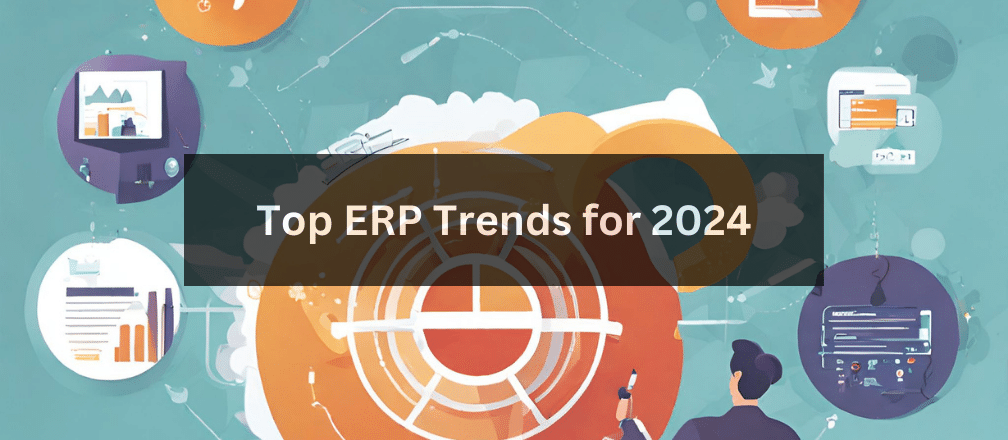The Top ERP Trends for 2024: Revolutionizing Business

Enterprise Resource Planning or ERP systems have become an inevitable choice for modern business operations. These are the backbones that provide an integrated approach and comprehensive knowledge to managing different processes within a company. As we have already moved on to 2024, there have been several changes in the industry.
Let’s explore evolving ERP trends in the landscape.
1. Improved efficiency with augmented finances:
SAP ERP solution has become a mandatory choice for different industries. Apart from the solution providing valuable insight into profitability, revenue, and cost, ERP systems have been integrated with advanced forecasting and predictive analytical trends. This advanced integration can forecast upcoming trends, optimize resource allocation, and identify potential risks. Machine learning algorithms in ERP solutions also analyze historical financial data and provide accurate recommendations and predictions, which helps in making informed decisions.

2. Cloud-first ERP:
The constant innovation and adoption have resulted in the advent of cloud-based ERP solutions. These solutions are not only driven by security, flexibility, and scalability, but they also ensure cost-effectiveness. The subscription-based model of cloud-first ERP solutions can be beneficial for most businesses. The Cloud ERP systems have been integrated with different features and functionalities that help in making real-time collaboration with different teams dispersed in different geographical locations, easy integration with different applications, and seamless upgrades.
3. Mobile ERP solutions:
Mobile ERP applications have become one of the most common choices. Not only do they provide easy access to data, but they are also known to be more functional. Some of the most common tasks, like submitting expense reports, approving workflow, and monitoring key performance indicators, become easy with the SAP mobile version. The optimized user interface for different devices and screen sizes provides a consistent experience across tablets, smartphones, and desktops.
4. Machine learning and artificial intelligence:
Machine learning and artificial intelligence are the algorithms that are most commonly used for tasks like fraud detection, predictive maintenance, customer segmentation, and demand forecasting in ERP systems. The integration of natural language processing capabilities in ERP systems allows users to seamlessly communicate with the system using chatbots and voice commands. Therefore, it helps to streamline query processes and data entry.
5. Integration of IOT:
IOT integration in SAP ERP systems can also provide real-time monitoring. It makes sure to pay attention to vehicles, equipment, and several other assets that might lead to optimized resource utilization and proactive maintenance. Data is collected and then analyzed to further identify inefficiencies, trigger automated actions, and detect abnormalities to improve the efficiency of the system.
6. Pay attention to security:
One of the most common benefits of employing an ERP system is the advanced encryption techniques. Apart from this, it also includes anomaly detection algorithms and multi-factor authentication to safeguard sensitive data from external and internal threats. This is absolutely beneficial for companies looking to find a secure Platform. Regular security audits and continuous monitoring can ensure compliance with industrial standards and regulations.
7. ESG factors and sustainability:
The SAP ERP modules have been designed for sustainability management. It generally tracks the key performance indicators that are associated with carbon emission, waste generation, energy consumption, and initiatives associated with social responsibilities. The availability of analytical tools can help people get valuable insight into the social and environmental impact of business operations. Therefore, it helps to make data-driven decisions based on sustainability initiatives.
8. Quantum computing and blockchain:
Blockchain technology makes sure to improve transparency and traceability in transactions within the system. This is especially true among industries that have to deal with complex regulatory requirements and supply chains. Quantum computing generally guarantees that faster data can be processed and have better encryption capabilities. Therefore, it can further improve the performance and security system of ERP systems in the future.
9. Expansion of operational scope:
ERP systems have been evolving to provide a comprehensive platform that can be easily integrated with third-party services and applications. The prime reason is to support end-to-end business processes. Some of the most common modules of customer relationship management, supply chain management, and business intelligence can be properly integrated to provide a unified view of the organization’s operations and performance metrics.
Conclusion
These are some of the latest ERP trends in 2024, which clearly reflect the rapid and dynamic technological landscape. Businesses that can embrace the trends will be able to compete with others. They can enjoy some of the most common benefits of improved adaptability, efficiency, and decision-making, which can help them make better transformations.
If you have decided to embrace the latest trends, you must look for an organization for ERP implementation. Cogniscient offers ERP specialists according to specific goals and requirements. Their implementation advice and suggestions can be especially beneficial for organizations.

